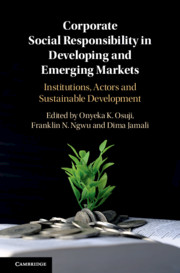 Corporate Social Responsibility in Developing and Emerging Markets
Corporate Social Responsibility in Developing and Emerging Markets Book contents
- Corporate Social Responsibility in Developing and Emerging Markets
- Corporate Social Responsibility in Developing and Emerging Markets
- Copyright page
- Dedication
- Contents
- Figures
- Tables
- Notes on Contributors
- Foreword
- Endorsement
- Preface
- Table of Cases
- Table of Legislation
- 1 Introduction to Corporate Social Responsibility in Developing and Emerging Markets: Institutions, Actors and Sustainable Development
- Part I Institutions, CSR Conceptualizations and Sustainable Development
- 2 Institutional Theory and Corporate Social Responsibility in Developing Countries: a Comparative Institutional Perspective
- 3 CSR and a Capabilities Approach to Development: CSR Laws as an Allocative Device?
- 4 Domestic Adjudicative Institutions, Developing Countries and Sustainable Development: Linkages and Limitations
- 5 The Informal Economy: CSR and Sustainable Development
- 6 Human Resource Management and Political CSR in Global Supply Chains: Causes and Consequences of Host Communities’ Enduring Struggles
- 7 Navigating the CSR Discourse from a Developing Country’s Perspective: a Shift to Human Capital Development?
- Part II CSR and Sustainable Development Cross-Country Studies
- Part III Normative and Utility Perspectives
- References
6 - Human Resource Management and Political CSR in Global Supply Chains: Causes and Consequences of Host Communities’ Enduring Struggles
from Part I - Institutions, CSR Conceptualizations and Sustainable Development
Published online by Cambridge University Press: 18 December 2019
- Corporate Social Responsibility in Developing and Emerging Markets
- Corporate Social Responsibility in Developing and Emerging Markets
- Copyright page
- Dedication
- Contents
- Figures
- Tables
- Notes on Contributors
- Foreword
- Endorsement
- Preface
- Table of Cases
- Table of Legislation
- 1 Introduction to Corporate Social Responsibility in Developing and Emerging Markets: Institutions, Actors and Sustainable Development
- Part I Institutions, CSR Conceptualizations and Sustainable Development
- 2 Institutional Theory and Corporate Social Responsibility in Developing Countries: a Comparative Institutional Perspective
- 3 CSR and a Capabilities Approach to Development: CSR Laws as an Allocative Device?
- 4 Domestic Adjudicative Institutions, Developing Countries and Sustainable Development: Linkages and Limitations
- 5 The Informal Economy: CSR and Sustainable Development
- 6 Human Resource Management and Political CSR in Global Supply Chains: Causes and Consequences of Host Communities’ Enduring Struggles
- 7 Navigating the CSR Discourse from a Developing Country’s Perspective: a Shift to Human Capital Development?
- Part II CSR and Sustainable Development Cross-Country Studies
- Part III Normative and Utility Perspectives
- References
Summary
Little is known about how subsidiaries of MNCs implement political CSR across Africa. The purpose of this paper is to determine how corporations respond to the many ‘pressures’ to align competing socioeconomic demands through political CSR and how that affects local communities in global supply chains. Based on field work in an emerging economy, we focus on a subsidiary of one of the world’s largest multinational palm oil producers and its HR Management. Contrary to what extant literature presents as pressures on MNCs to fulfil demands that are neither related to their raison d’être nor competence, we found that socioeconomic demands in low-income countries are rather the local communities’ natural response to shocks emanating from the presence of the subsidiary in their community. The ensuing dramatic changes in the socio-cultural, political and economic institutions underpinning their way of life are articulated as ‘5Ds’: dispossession of land; displacement of people; destruction of the environment; desperation; and de-democratization through disenfranchisement. Our micro-level analysis reveals HR managers’ dilemma. They are mostly torn between responding to community’s grievances and the profit-maximization intents of the firm. They make attempts to liaise and create dialogue but ultimately loyalty to the subsidiary is privileged over social demands.
Keywords
Information
- Type
- Chapter
- Information
- Corporate Social Responsibility in Developing and Emerging MarketsInstitutions, Actors and Sustainable Development, pp. 98 - 118Publisher: Cambridge University PressPrint publication year: 2019
References
Accessibility standard: Unknown
Why this information is here
This section outlines the accessibility features of this content - including support for screen readers, full keyboard navigation and high-contrast display options. This may not be relevant for you.Accessibility Information
- 1
- Cited by